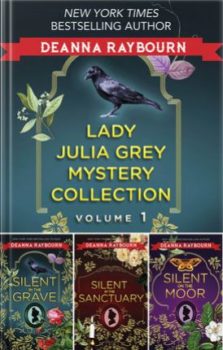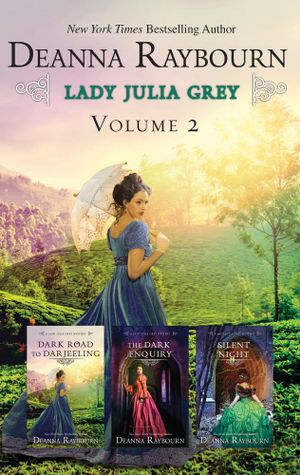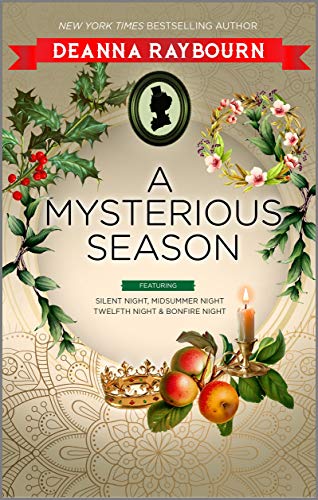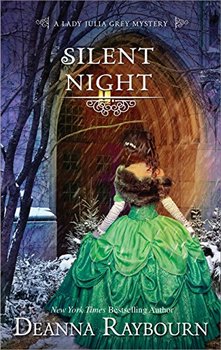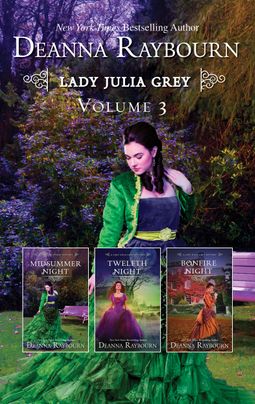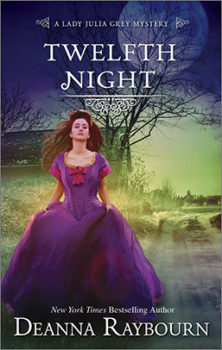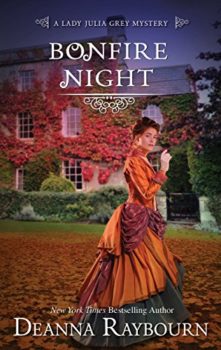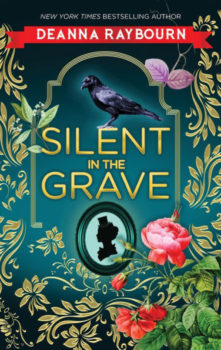
Lady Julia Grey Mysteries #1
July 15, 2019
Silent In The Grave
Only from New York Times bestselling author Deanna Raybourn, go back to where it all began with the original Lady Julia Grey historical mystery series.
“Let the wicked be ashamed, and let them be silent in the grave.”
These ominous words are the last threat that Sir Edward Grey receives from his killer. Before he can show them to Nicholas Brisbane, the private inquiry agent he has retained for his protection, he collapses and dies at his London home, in the presence of his wife, Julia, and a roomful of dinner guests.
Prepared to accept that Edward’s death was due to a long-standing physical infirmity, Julia is outraged when Brisbane visits and suggests that her husband was murdered. It is a reaction she comes to regret when she discovers damning evidence for herself, and realizes the truth.
Determined to bring the murderer to justice, Julia engages the enigmatic Brisbane to help her investigate Edward’s demise. Dismissing his warnings that the investigation will be difficult, if not impossible, Julia presses forward, following a trail of clues that lead her to even more unpleasant truths, and ever closer to a killer who waits expectantly for her arrival.
Originally published December 2006 in hardcover, December 2007 in mass market paperback, January 2009 in trade paperback and August 2015 in eBook.
To say that I met Nicholas Brisbane over my husband’s dead body is not entirely accurate. Edward, it should be noted, was still twitching upon the floor.
I stared at him, not quite taking in the fact that he had just collapsed at my feet. He lay, curled like a question mark, his evening suit ink-black against the white marble of the floor. He was writhing; his fingers knotted.
I leaned as close to him as my corset would permit.
“Edward, we have guests. Do get up. If this is some sort of silly prank—”
“He is not jesting, my lady. He is convulsing.”
An impatient figure in black pushed past me to kneel at Edward’s side. He busied himself for a few brisk moments, palpating and pulse-taking, while I bobbed a bit, trying to see over his shoulder. Behind me the guests were murmuring, buzzing, pushing closer to get a look of their own. There was a little thrill of excitement in the air. After all, it was not every evening that a baronet collapsed senseless in his own music room. And Edward was proving rather better entertainment than the soprano we had engaged.
Through the press, Aquinas, our butler, managed to squeeze in next to my elbow.
“My lady?”
I looked at him, grateful to have an excuse to turn away from the spectacle on the floor.
“Aquinas, Sir Edward has had an attack.”
“And would be better served in his own bed,” said the gentleman from the floor. He rose, lifting Edward into his arms with a good deal of care and very little effort, it seemed. But Edward had grown thin in the past months. I doubted he weighed much more than I.
“Follow me,” I instructed; although, Aquinas actually led the way out of the music room. People moved slowly out of our path, as though they regretted the little drama ending so quickly. There were some polite murmurs, some mournful clucking. I heard snatches as I passed through them.
“The curse of the Greys, it is—”
“So young. But of course his father never saw thirty-five.”
“Never make old bones—”
“Feeble heart. Pity, he was always such a pleasant fellow.” I moved faster, staring straight ahead so that I did not have to meet their eyes. I kept my gaze fixed on Aquinas’ broad, black-wool back, but all the time I was conscious of those voices and the sound of footsteps behind me, the footsteps of the gentleman who was carrying my husband. Edward groaned softly as we reached the stairs, and I turned. The gentleman’s face was grim.
“Aquinas, help the gentleman—”
“I have him,” he interrupted, brushing past me. Aquinas obediently led him to Edward’s bedchamber. Together they settled Edward onto the bed, and the gentleman began to loosen his clothes. He flicked a glance toward Aquinas.
“Has he a doctor?”
“Yes, sir. Doctor Griggs, Golden Square.”
“Send for him. Although, I dare say it will be too late.”
Aquinas turned to me where I stood, hovering on the threshold. I never went into Edward’s room. I did not like to do so now. It felt like an intrusion, a trespass on his privacy.
“Shall I send for Lord March as well, my lady?”
I blinked at Aquinas. “Why should Father come? He is no doctor.”
But Aquinas was quicker than I. I had thought the gentleman meant that Edward would have recovered from his attack by the time Doctor Griggs arrived. Aquinas, who had seen more of the world than I, knew better.
He looked at me, his eyes carefully correct, and then I understood why he wanted to send for Father. As head of the family he would have certain responsibilities.
I nodded slowly. “Yes, send for him.” I moved into the room on reluctant legs. I knew I should be there, doing whatever little bit that I could for Edward. But I stopped at the side of the bed. I did not touch him.
“And Lord Bellmont?” Aquinas queried.
I thought for a moment. “No, it is Friday. Parliament is sitting late.”
That much was a mercy. Father I could cope with, but not my eldest brother as well. “And I suppose you ought to call for the carriages. Send everyone home. Make my apologies.”
He left us alone then, the stranger and I. We stood on opposite sides of the bed, Edward convulsing between us. He stopped after a moment, and the gentleman placed a finger at his throat.
“His pulse is very weak,” he said finally. “You should prepare yourself.”
I did not look at him. I kept my eyes fixed on Edward’s pale face. It shone with sweat, its surface etched with lines of pain. This was not how I wanted to remember him.
“I have known him for more than twenty years,” I said finally, my voice tight and strange. “We were children together. We used to play pirates and knights of the Round Table. Even then, I knew his heart was not sound. He used to go quite blue sometimes when he was overtired. This is not unexpected.”
I looked up then to find the stranger’s eyes on me. They were the darkest eyes I had ever seen, witch-black and watchful. His gaze was not friendly. He was regarding me coldly, as a merchant will appraise a piece of goods to determine its worth. I dropped my eyes at once.
“Thank you for your concern for my husband’s health, sir. You have been most helpful. Are you a friend of Edward’s?”
He did not reply at once. Edward made a noise in the back of his throat, and the stranger moved swiftly, rolling him onto his side and thrusting a basin beneath his mouth. Edward retched, horribly, groaning. When he finished, the gentleman put the basin to the side and wiped his mouth with his handkerchief. Edward gave a little whimper and began to shiver. The gentleman watched him closely.
“Not a friend, no. A business associate,” he said finally. “My name is Nicholas Brisbane.”
“I am—”
“I know who you are, my lady.”
Startled at his rudeness, I looked up, only to find those eyes again, fixed on me with naked hostility. I opened my mouth to reproach him, but Aquinas appeared then. I turned to him, relieved.
“Aquinas?”
“The carriages are being brought round now, my lady. I have sent Henry for Doctor Griggs and Desmond for his lordship. Lady Otterbourne and Mr. Phillips both asked me to convey their concern and their willingness to help should you have need of them.”
“Lady Otterbourne is a meddlesome old gossip and Mr. Phillips would be no use whatsoever. Send them home.”
I was conscious of Mr. Brisbane behind me, listening to every word. I did not care. For some unaccountable reason, the man thought ill of me already. I did not mind if he thought worse.
Aquinas left again, but I did not resume my post by the bed. I took a chair next to the door and remained there, saying nothing and wondering what was going to happen to all of the food. We had ordered far too much in any event. Edward never liked to run short. I could always tell Cook to serve it in the servants’ hall, but after a few days even the staff would tire of it. Before I could decide what to do with the lobster patties and salad molds, Aquinas entered again, leading Doctor Griggs. The elderly man was perspiring freely, patting his ruddy face with a handkerchief and gasping. He had taken the stairs too quickly. I rose and he took my hand.
“I was afraid of this,” he murmured. “The curse of the Greys, it is. All snatched before their time. My poor girl.” I smiled feebly at him. Doctor Griggs had attended my mother at my birth, as well as her nine other confinements. We had known each other too long to stand on ceremony. He patted my hand and moved to the bed. He felt for Edward's pulse, shaking his head as he did so. Edward vomited again, and Doctor Griggs watched him carefully, examining the contents of the basin. I turned away.
I tried not to hear the sounds coming from the bed, the groans and the rattling breaths. I would have stopped my ears with my hands, but I knew it would look childish and cowardly. Griggs continued his examination, but before he finished Aquinas stepped into the room.
“Lord March, my lady.” He moved aside and Father entered.
“Julia,” he said, opening his arms. I went into them, burying my face against his waistcoat. He smelled of tobacco and book leather. He kept one arm tucked firmly around me as he looked over my head.
“Griggs, you damned fool. Julia should have been sent away.”
The doctor made some reply, but I did not hear it. My father was pushing me gently out the door. I tried to look past him, to see what they were doing to Edward, but Father moved his body and prevented me. He gave me a sad, gentle smile. Anyone else might have mistaken that smile, but I did not. I knew he expected obedience. I nodded.
“I shall wait in my room.”
“That would be best. I will come when there is something to tell.”
My maid, Morag, was waiting for me. She helped me out of my silk gown and into something more suitable. She offered me warm milk or brandy, but I knew I would never be able to hold anything down. I only wanted to sit, watching the clock on the mantel as it ticked away the minutes left.
Morag continued to fuss, poking at the fire and muttering complaints about the work to come. She was right about that. There would be much work for her when I put on widow’s weeds. It was unlucky to keep crepe in the house, I reminded myself. It would have to be sent for after Edward passed. I thought about such things—crepe for the mirrors, black plumes for the horses—because then I did not have to think about what was happening in Edward’s room. It was rather like waiting for a birth, these long, tense minutes of sitting, straining one’s ears on tiptoe for the slightest sound. I expected to hear something, but the walls were thick and I heard nothing. Even when the clock struck midnight, the little voice on my mantel chiming twelve times, I could not hear the tall case clock in the hall. I started to mention the peculiarity of it to Morag, because one could always hear the case clock from any room in the house, when I realized what it meant.
“Morag, the clocks have stopped.”
She looked at me, her lips parted to speak, but she said nothing. Instead she bowed her head and began to pray. A moment later, the door opened. It was Father. He said nothing. I went to him and his hand cradled my head like a benediction. He held me for a very long time, as he had not done since . . .
© Reprinted by permission. All rights reserved.
back to Top
In this imaginative and beautifully written debut novel, Deanna Raybourn transports us into the complex and rarified world of the Victorian aristocracy. The questions and discussion topics that follow will, we hope, enhance your enjoyment of this remarkable book.
- Julia Grey was born into a large family of wealth and privilege. How do the Marches resist the confines and expectations of Victorian society? Are they always successful?
- Families such as the Marches relied heavily upon numerous servants to handle the day to day operation of their homes. Discreet and diplomatic servants were invaluable. How do you think Aquinas, Morag and Monk acquitted themselves? Would you hire them?
- As an arrangement between friends rather than a love match, Edward and Julia’s marriage was typical of the time. Do you suppose Edward was happy with the arrangement? Can you think of modern examples of, or reasons for, such a match?
- How is Julia’s role within her marriage reflected in the setting of Grey House? Contrast the setting of Grey House with that of Nicholas Brisbane’s rooms in Chapel Street.
- The book covers a murder investigation but also a woman’s journey as she discovers her authentic self. Describe the most important ways Julia begins to know herself. Could she have known any of these things while married to Edward?
- At the heart of the book is Julia’s relationship with two archetypal men: Edward and Nicholas. Compare and contrast these relationships. Is there one important thing that each man may have given Julia?
- The happiest relationships in this book are not conventional ones. Discuss characters who seems to have found personal happiness, and why this is so.
- Nicholas struggles with flashes of precognition. Is this ability a gift or a curse? How could he have made better use of it?
- What drives Nicholas? What sort of man is he? How does he differ from the other men in Julia’s life?
- Given their characters, histories and status, is a romantic relationship between Julia and Nicholas sustainable?
- The motive behind Edward’s murder is jealousy. Would you consider this a crime of passion? Is it possible to kill someone you truly love?
- There are numerous and engaging secondary characters in this novel–including a bird! Which of these characters did you most enjoy, and why?
- Death had its own culture in Victorian England. How does this culture differ from modern times? Discuss a few of the customs referred to in the book. Who or what do you think was the genesis of these conventions?
- Despite the serious nature of the subject, this story is written with a great deal of humor and wit. Describe one scene that you found particularly amusing.
- Given the drawbacks of living in Victorian England, and the privileges of wealth and good birth, would you trade places with Julia?
